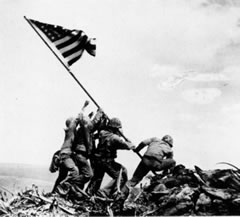|
 Throughout
our history, America has been involved in numerous conflicts for
many reasons, but the underlying motivation for sending our troops
to war has been to eradicate oppression throughout the world. Throughout
our history, America has been involved in numerous conflicts for
many reasons, but the underlying motivation for sending our troops
to war has been to eradicate oppression throughout the world.
The United States has liberated the oppressed in every war we have
entered. US foreign policy states that we are to engage our troops
only as a matter of our own national interest. According to Secretary
Weinberger, "we cannot assume for other sovereign nations the
responsibility to defend their territory -- without their strong
invitation -- when our own freedom is not threatened.”
It also states that we should commit forces "wholeheartedly
and with the clear intention of winning." Weinberger further
explains this by defining winning as ”achieving our objectives."
We did not achieve our political objectives in Vietnam because our
objectives were unclear and we failed to obtain national support
at home. Conversely, President Bush made it clear that our objectives
in the Gulf War were to remove Saddam's forces from Kuwait and restore
the lawful government
Point four states that the relationship between the objectives
and the forces committed must be continually reassessed and, if
necessary, readjusted, because conditions and objectives invariably
change during the course of a conflict
Point five declares that prior to committing forces, there must
be "some reasonable assurance we will have the support of the
American people and their elected representative in Congress."
Weinberger says the key to obtaining such support is candidness
in "making clear the threats we face.
Point six says the commitment of U.S. forces to combat should be
a last resort." This is not isolationist or pacifist language,
for Weinberger observes that early strong reaction to a situation
may prevent the necessity for later "lion-like" responses.
Certainly mindful of the Vietnam misadventure, he cautions against
a "gradualist incremental approach" which would draw us
into an "endless morass."
Obviously, none of the criteria should be viewed in an isolated
context, for as Clausewitz teaches, war is the ultimate tool of
diplomacy where force is used to achieve an objective when other
means fail. Clearly, in the Gulf crises, as Dubois points out, "by
operating under the aegis of the United Nations diplomatically,
financially, and in many cases militarily, the Administration clearly
signaled our desire to achieve our objectives short of combat."
Dubois is correct when he describes our policy as "most patient."
Saddam was given every opportunity to avert hostilities. Coalition
force was indeed used as a last resort.
The use of force in the Gulf War was necessary, morally justified,
and legal under international law. The actions taken were proportional
to the threat and designed to accomplish the stated and limited
objective of removing a hostile invading force from a sovereign
territory. The Bush Administration's approach to the situation was
a logical and justified response, which clearly reflects the sound
policy considerations espoused by Secretary Weinberger.
The Korea/Vietnam Memorial and National Education Center is being
built to honor the Americans who have fought for liberty and freedom
thoughout the world - from the Revolutionary War to the recent conflict
in Iraq.
To learn more about the history of America at war, check out our
"Focus" sections:
|